| Srl | Item |
| 1 |
ID:
159069
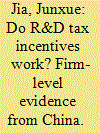

|
|
|
|
|
| Summary/Abstract |
Tax incentives have been used worldwide to encourage firm R&D, but there is little evidence on their effectiveness as a policy tool in developing countries. We use a panel dataset of Chinese listed companies covering 2007 to 2013 to assess the effects of tax incentives on firm R&D expenditures and analyze how institutional conditions shape these effects. Our results show that tax incentives motivate R&D expenditures for our sample firms. A 10% reduction in R&D user costs leads firms to increase R&D expenditures by 3.97% in the short run. We also find considerable effect heterogeneity: Tax incentives significantly stimulate R&D in private firms but have little influence on state-owned enterprises' R&D expenditures. Moreover, the effects of tax incentives are more pronounced for private firms without political connections. Hence, reducing political intervention complements tax incentives' capacity to foster firm R&D in developing countries.
|
|
|
|
|
|
|
|
|
|
|
|
|
|
|
|
| 2 |
ID:
187803


|
|
|
|
|
| Summary/Abstract |
Poor targeting performance is a common concern in the increasingly implemented decentralized targeted antipoverty programs in developing countries. Different from previous literature that focuses on targeting errors caused by elite capture, we explore the role of villager social capital as a whole in poverty targeting in the context of China's Targeted Poverty Alleviation (TPA) policy. The empirical analysis uses a unique census-type data from three administrative and seventeen natural villages in the poverty-stricken county in Western China in 2017. Villager social capital is measured by a proxy index by combing reciprocity, support time, gift expenses, and political connection of villagers. We verify that the villager with rich villager social capital is more likely to be a beneficiary of TPA by using instrumental variable estimation. The nonpoor can mobilize their higher level of social capital than the poor to capture the beneficiary quotas that should be allocated to the poor, resulting in mistargeting. Such effect persists after controlling political elite capture effects. The findings point out villager social capital is the root cause of poor targeting in decentralized targeting programs in rural China and also lend new support from China to the classic debate on social capital is not the capital of the poor.
|
|
|
|
|
|
|
|
|
|
|
|
|
|
|
|
| 3 |
ID:
182735
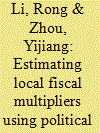

|
|
|
|
|
| Summary/Abstract |
We use political connections between central and local governments in China to identify the effects of government spending. Our key innovation is using changes of central government ministers as a source of exogenous variation in earmarked transfers received by prefectural city-level governments. The analysis reveals that the increase in earmarked transfers is temporary and local effective tax rates do not respond to such fiscal expansions. Given that using cross-regional analysis for a monetary union can difference out the influence of monetary policy, the fiscal shock we study is a temporary, non-tax financed and no-monetary-policy-response government spending shock. We find the local fiscal multiplier in China is above one and there are no significant spillover effects from local government spending.
|
|
|
|
|
|
|
|
|
|
|
|
|
|
|
|
| 4 |
ID:
186938
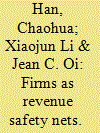

|
|
|
|
|
| Summary/Abstract |
The political connection between the state and firms in the context of China's corporate restructuring has been little explored. Using the clientelist framework and unpacking the incentives of both firms and the state, we analyse political connections as repeated patron–client exchanges where the politically connected firms can help the state fulfil its revenue imperative, serving as a failsafe for local authorities to ensure that upper-level tax quotas are met. Leveraging original surveys of the same Chinese firms over an 11-year period and the variations in their post-restructuring board composition, we find that restructured state-owned enterprises (SOEs) with political connections pay more tax than their assessed amount, independent of profits, in exchange for more preferential access to key inputs and policy opportunities controlled by the state. Examining taxes rather than profits also offers a new interpretation for why China continues to favour its remaining SOEs even when they are less profitable.
|
|
|
|
|
|
|
|
|
|
|
|
|
|
|
|
| 5 |
ID:
170349
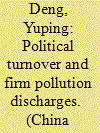

|
|
|
|
|
| Summary/Abstract |
This paper aims to examine the relationship between political turnover and pollution discharges by listed firms in China. The empirical results show that political turnover is associated with more firm pollution discharges, particularly if the newly appointed officials are promoted locally or normally transferred. Furthermore, higher frequency of political turnover is linked with more pollution discharges. Lastly, our extended analysis illustrates that political connection is positively associated with firm pollution discharges and plays a moderating role in the relationship between political turnover and environmental performance.
|
|
|
|
|
|
|
|
|
|
|
|
|
|
|
|
| 6 |
ID:
131793
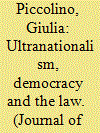

|
|
|
|
|
| Publication |
2014.
|
| Summary/Abstract |
Although much has been written about the ideology of Laurent Gbagbo's Front Populaire Ivoirien in Côte d'Ivoire and its impact on the Ivorian politico-military crisis, little attention has been paid to the ubiquitous role of the law in the discourse and political strategy of the pro-Gbagbo elite. The Ivorian case may provide important insights about the connection between ultranationalist ideology and a legalist, formalist conception of democracy and national sovereignty. The article analyses the circumstances of the emergence of 'legalist nationalism' in Côte d'Ivoire by looking at key episodes of the Ivorian transition between 2002 and 2012. The article discusses the relevance of Pierre Englebert's concept of 'legal command' and the turbulences of democratic transitions in accounting for the prominence of legalism in Ivorian politics. It explores the implications of the Ivorian case for understanding the connection between law and politics in Africa.
|
|
|
|
|
|
|
|
|
|
|
|
|
|
|
|